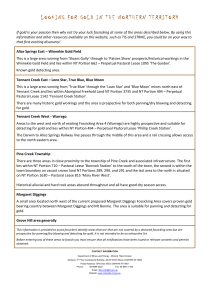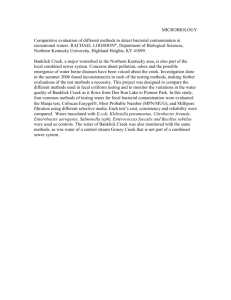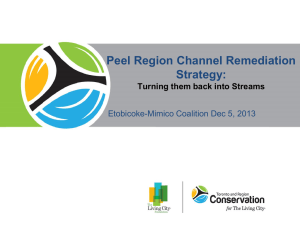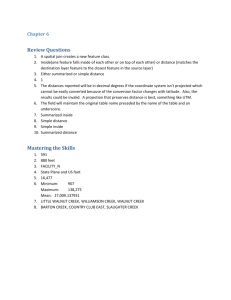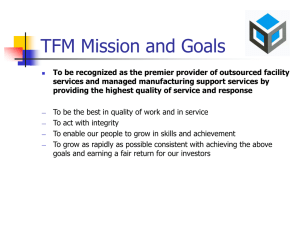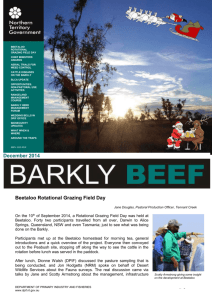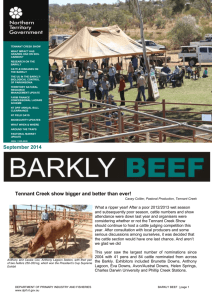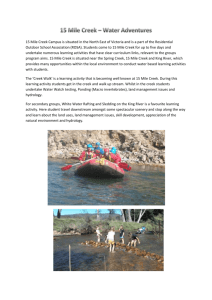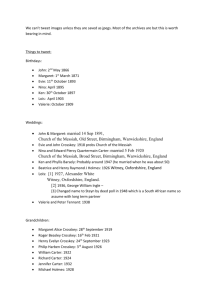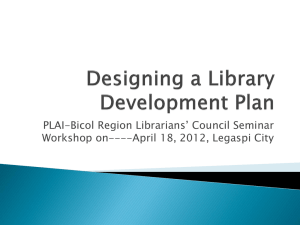Tennant Creek Our Business - Department of Industry, Innovation
advertisement
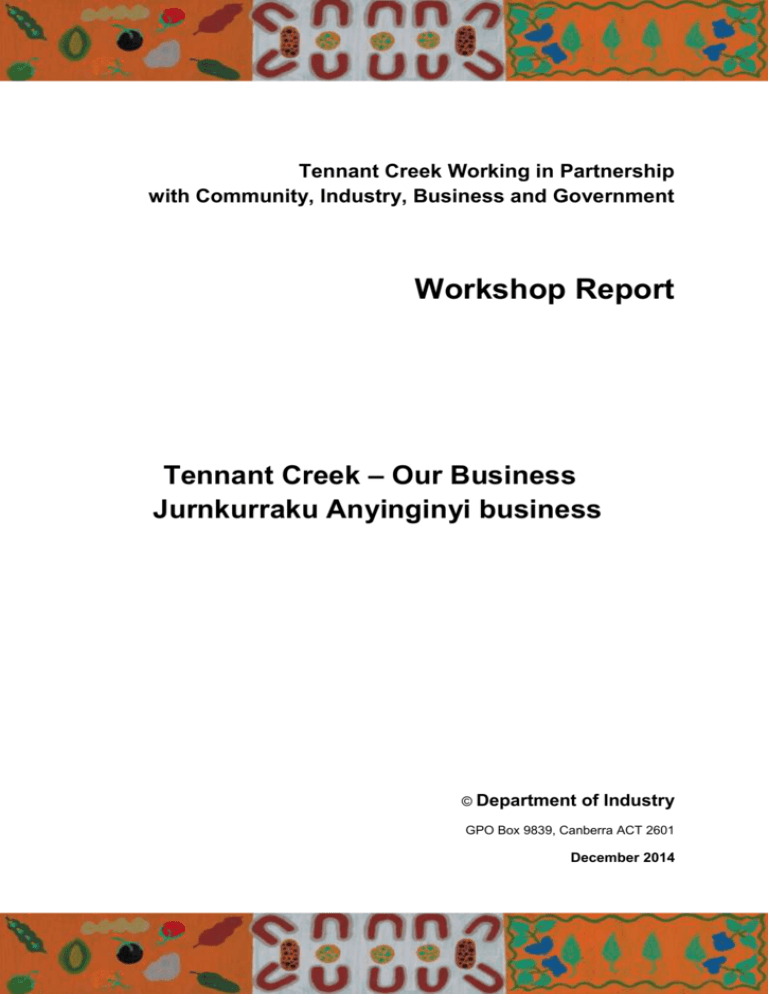
Tennant Creek Working in Partnership with Community, Industry, Business and Government Workshop Report Tennant Creek – Our Business Jurnkurraku Anyinginyi business © Department of Industry GPO Box 9839, Canberra ACT 2601 December 2014 Contents 1. Executive summary ......................................................................................................................... 3 2. Working in Partnership introduction .............................................................................................. 4 3. Tennant Creek workshop ................................................................................................................ 4 4. Consultation process....................................................................................................................... 5 5. Purpose of this report ..................................................................................................................... 5 6. Stakeholders ................................................................................................................................... 6 7. Day 1 workshop overview ............................................................................................................... 6 8. Presentations .................................................................................................................................. 7 9. Day 2 workshop overview ............................................................................................................. 15 10. Evaluation ................................................................................................................................. 21 11. Reflections................................................................................................................................. 21 12. Workshop Summary and Close ................................................................................................. 22 13. Appendix A – Workshop Agenda .............................................................................................. 23 14. Appendix B – Workshop Participants........................................................................................ 26 15. Appendix C – Workshop Idea Matrix ........................................................................................ 29 1. Executive summary The Tennant Creek Working in Partnership (WIP) workshop (the workshop) was held at the Battery Hill Mining Complex in Tennant Creek over 15 and 16 April 2014. The workshop was the culmination of several periods of consultation since October 2013. The theme for the workshop was: Tennant Creek – Our Business / Jurnkurraku Anyinginyi Business The workshop attracted over 40 participants representing local Aboriginal communities and organisations, mining companies, small and medium businesses, education and training service providers and the three levels of government. The intent of the workshop, reflecting on the broader WIP initiative, was to create further opportunities to contribute to sustained employment for local Aboriginal people in mining, tourism and related industries while fostering new viable enterprises. It provides an opportunity to develop a generosity of spirit and intent to identify positive outcomes. The workshop also provided participants with a real opportunity to shape an agreed plan of action for engagement. This should improve Aboriginal training pathways, employment opportunities and business development outcomes in the Barkly region and beyond. Just as important is the stimulus the workshop provided for various regional plans and existing micro businesses in and around Tennant Creek and other communities in the Barkly. Participants agreed that that range of presentations provided a good scope of issues impacting on economic development and increased business and employment opportunities in the region. It was agreed that presentations would be made available on the department’s website for reference. The workshop provided a platform for individuals and businesses to build strong relationships and business networks. These connections will ideally develop into enduring, mutually beneficial relationships that form a driver for individual and business development. It is expected that the Regional Economic Development Committee (REDC) will continue to work closely with community and government to ensure that outcomes can be reached. The key challenge for the success of this workshop is that the community support the implementation of the agreed outcomes and to ensure that those responsible for bringing them to completion are held to account. 2. Working in Partnership introduction The Working in Partnership (WIP) – the Mining Industry and Indigenous Communities Program was launched by the Australian Government on 3 August 2001. The initiative is administered by the Department of Industry and seeks to promote long term partnerships between Aboriginal communities and the exploration and mining industry. In addition to promoting long term relationships, the initiative supports and encourages ongoing cultural change between the exploration and mining industry and Aboriginal communities across Australia. It builds on relevant research which has been conducted in relation to sustainable mining practices. More information can be accessed at: http://www.industry.gov.au/resource/Programs/WorkingInPartnership/Pages/default.aspx The initiative has included a series of regionally based workshops in areas of mining interest throughout Australia. All workshops have served to bring together interested parties in significant regional centres to discuss local issues to achieve local employment outcomes for Aboriginal communities and businesses. 3. Tennant Creek workshop The ‘Tennant Creek – Our Business / Jurnkurraku Anyinginyi Business’ workshop was conducted over 15 and 16 April 2014 at the Battery Hill Mining Complex, Tennant Creek, on Warramungu country, in the Northern Territory. More than 40 participants attended the workshop over two days, information on participants can be seen at Appendix B. The workshop aimed to provide a neutral environment in which all stakeholders could meet to discuss challenges and issues and consider regional specific solutions relevant to the development of partnered approach across the Barkly. Participants were encouraged to: Identify with other stakeholders to gain a better understanding of their respective issues and to better appreciate their aspirations and priorities. Identify employment, cooperative and microbusiness opportunities in the region. Like previous workshops in the series, this workshop was designed to create opportunities for regional stakeholders to contribute to discussions relevant to sustained employment and business enterprise development for local aboriginal people in mining, tourism and related industries across the Barkly region. 4. Consultation process Toward the latter part of 2013 the WIP coordinator, assisted by local resident and training consultant, Mr Elliott McAdam and Minerals Council of Australia central desert coordinator, Mr Martin Glass, consulted with local individuals, peak bodies, businesses and organisations around the Barkly. Due to unforeseen circumstances within the community the scheduled November workshop was postponed until mid-2014. Consultations continued into 2014 with departmental staff and Indigenous Consulting Group facilitator, Brett Barlee. Extensive consultation was undertaken with a broad cross section of industry, government and community stakeholder groups across the Barkly. These meetings were held between October 2013 and March 2014. Following an unforseen event delaying the publication of the workshop report the department conducted one further consultation round in August 2014 to meet with some key stakeholders. This consultation was used to ensure that the report would include all key outcomes from the workshop but in addition would include reflections from the Tennant Creek and Barkly region community. The department would like to acknowledge the contributions of Elliott McAdam and Martin Glass to its 2013 consultations and to Brett Barlee for the contributions made to the 2014 consultations, workshop and follow up consultation. The Barkly region covers more than 300,000 square kilometres (21 per cent of the NT) and has the lowest population density in the NT. Tennant Creek is situated on the Stuart Highway approximately 1,000 kilometres south of Darwin and 500 kilometres north of Alice Springs. According to the Australian Bureau of Statistics, in 20123570 people live in Tennant Creek with a total of 6,659 people in the greater Barkly region. Of this number in the Barkly 69 per cent are Aboriginal peoples. Aboriginal people have lived in the Barkly region for over 40,000 years. Around nine Aboriginal groups call the area home, including the Warumungu, Warlpiri, Kaytetye and Alyawarra peoples. Tennant Creek is a social, cultural and business centre for many Aboriginal people from various language groups. 5. Purpose of this report This report provides an overview of the Tennant Creek WIP workshop and includes a summary of presentations, potential opportunities to be exercised and reflections. This report outlines two days of activities and discussions, together with a program of actions to be actioned by participants. Held at the iconic Battery Hill Mining Complex the first day was opened by a traditional welcome to country. This was followed by a series of presentations by mining and other companies, training and tourism bodies and operators, local government and other agencies active in the region. 6. Stakeholders Figure 1. Tenant creek Economic development eco system 7. Day 1 workshop overview There were four rounds of consultations conducted with the Tennant Creek and the Barkly region stakeholders in the lead up to the workshop. Throughout these consultations it became apparent that the concept of the workshop should evolve around two key phases - collaborative growth and collective impact. The consensus amongst stakeholders was that the workshop should aim to produce a range of concrete initiatives that would generate economic and/or social benefit for the participants over the short to medium term of 1-3 years. This benefit could be in the form of new business and community initiatives or through strategies, plans and structures necessary to build the foundations for economic and community benefit or both. On day one Presenters were asked to focus on collaborative growth opportunities and ways of developing collective approaches of generating this growth in their presentations. They were also asked to identify the current challenges to achieving this growth and identify some of the ways they are meeting these challenges. The audience was asked to evaluate the presentations on a set of criteria designed to help the listener to recognise and/or listen for opportunities that may exist either in the presentation or as a result of the presentation. The purpose of this was to assist participants during day 2 in their role of developing their own initiatives. The criteria used by the group in evaluating the presentations were as follows: Would the idea be of benefit to the communities of the Barkly? Could it create a job? Could it create a business? Could it enable an existing business? Could it tap into an existing market? Could it create a new market? Could it be done in partnership with an existing business or enterprise? 8. Presentations The following represents a brief summary of collective reflections and ideas based on the presentations and discussions during the workshop. The presentations will be available on the department’s website for a period until June 2015 for stakeholders to view. Session one – The exploration and mining industry Presenter: Mr Paul McHugh Company: OM Manganese Ltd Opportunities: Future opportunities for local businesses to tender for small to medium scale contracts. Opportunities were identified to add value to the OM Manganese supply chain with services such as civil construction, revegetation, fencing and restoration to the mine site. Potential long term opportunities for employment including six trainees ensuring onsite training, mentoring programs and on site living for block periods. Challenges: There is an absence of work ready trainees and a shortage of trainee positions available in an operation of our size. In the absence of work ready trainees the mine will need to continue to import skilled labour from outside the region. Working a roster can create a sense of community isolation. Presenter: Mr Brian Fowler Company: Arafura Resources Limited Opportunities: The mine will create regional opportunities and business development through shared infrastructure with nearby communities. Sponsorship of community programs and initiatives when in operation. Business opportunities through supporting the project including logistics, suppliers and services. Priority to Aboriginal and local community employment and training. Challenges: Barrier to employment and identified training needs include: Life skills training required ensuring potential employers commitment and work ethic. All potential employees will be put through rigorous and thorough candidate selection process. People have expectations of where they want to work but the industry cannot always cater for these wants. Employees must have champions and mentors to ensure a good pathway to success. Session two – regional industry and arts Presenter: Ms Jo Turner and Ms Ashlee Murphy Company: National Indigenous Training Academy Opportunities: The Indigenous Traineeship Program offers 100 certificate 2 & 3 traineeship positions at Yulara each year, with trainees coming from around Australia to live, work and learn. Indigenous Land Corporation partners work closely to provide all aspects of a 12 month residential Traineeship environment – formal classroom training, lifestyle, and on the job learning in the workplace. Various position available in back of house (housekeeping/cleaning, landscaping, maintenance, kitchen) and front of house (retail, food & beverage, guest activities, receptionist, business administration). Mentoring and buddying up opportunities with fellow trainees and graduates. Challenges: Presenter: Mr John Di Maria Company: Tourism NT Opportunities: Tourism NT is looking to enhance visitor servicing and experience development opportunities including: High-quality visitor experience gateways that embrace new technologies Research and programs to support Asian market development. Build cross-industry alliances to drive experience development Encourage new immersive experiences and compatible commercial development in Parks. Encourage Indigenous Tourism Experiences to capitalise on new market opportunities Increase Indigenous cultural representation in the delivery of experiences. Challenges: Need to ensure adequate and appropriate marketing is undertaken for the whole tourism experience for visitors to the NT. Total domestic visitors to the NT down 13% for 2013, compared to the previous year. Total domestic expenditure for the NT down 14% for 2013, compared to previous year. Presenter: Mr Alan Murn and Ms Kathy Burns Company: Barkly Regional Arts Opportunities: The Desert Harmony Festival is 100% community owned and 50 % of production and materials were sourced from Tennant Creek and the Barkly. The festival brought in 105 paid artists over 10 days in 2013 spending approx. $235 each in the community on accommodation, meals, fuel and incidentals. A 20% increase in interstate media companies profiling the festival shows the positive development that is occurring in the region due to the festival. The festival provides the community with tailored training and employment opportunities which could lead to full time employment in a particular industry. The festival is one of the few events that has an impact on tourism numbers in Tennant Creek and the Barkly. Challenges: Barkly Regional Arts needs ‘manpower’ including volunteers and paid employees during the months leading up to and during the festival The Tennant Creek and Barkly region will need to think about how they can add value to the festival and take ownership of the festival to ensure its longevity. Presenter: Ms Kate Foran Company: Nyinkka Nyunyu Art and Cultural Centre Opportunities: There are opportunities through collaboration with tourism and the arts to offer tourists and visitors a full cultural experience showcasing the region. Opportunity to grow the business through improved marketing and signage which can be done collaboratively. Employment opportunities for local Aboriginal people wanting to work in Indigenous tourism and eco-tourism on country. The Nyinkka Nyunyu Centre could act as a feeder for tourism to the town. Challenges: The community needs to work collaboratively to remove the apathy that surrounds the town. Session three - Pre-employment education, training and recruitment Presenter: Mr Alf Leonardi Company: Department of Education Opportunities: Employment pathways model – provides clear pathway from school to job Year 7 and 8 (excursions to workplaces) Year 9 (VET certificate, general workplace skills) Year 10, 11, 12 (specialisation based on vocational interests). Hard skills training incorporated e.g. white card, drivers licence, work at heights, barista. School based apprenticeships and traineeships. Challenges Identifying suitable workplaces Creating workplace partnerships Developing learning contracts in partnership with employers/ employer groups Need to develop a mechanism to enable secondary school teachers to work with employers to identify economic value to the workplace. Presenter: Mr Steve Bowker Company: Department of Prime Minister and Cabinet Opportunities: The Remote Jobs and Communities Program (RJCP) was established n 2013and will inject 1.5 billion over five years to communities across Australia including the Barkly. The RJCP is designed to provide personalised support for job seekers. The on the ground service approach ensures that providers have closer connections with job seekers. The RJCP aims to provide participation opportunities and foundational skills. The Youth Corps is designed to keep youth engaged and provide pathways from school to employment. Challenges Ensuring that Community Action Plans are done in consultation with the community to give a sense of ownership of the objectives. Presenter: Ms Meg McGrath Company: Department of Business Opportunities: To establish mentoring programs for job seekers to have a connection with a person who has been long term employed or business owners in the region. Challenges Training providers are not coming to Tenant Creek due to lack of critical mass and demand which is taking away options for people wanting to undertake training. Ever changing government policy affects people on the margins as they are unable to adjust to the constant change. People’s expectations of what is required of them when undertaking training can be far less than the reality which can create large turnover rates. Presenter: Ms Maisie Floyd Company: Tennant Creek High School Opportunities: The High School is open to innovative idea and partnerships with community and business. The High School is working with students to ensure increased attendance rates and to encourage them to be in school longer to better their educations and move into the workforce. Approx. 70-75& attendance rate. The High School is collaborating with the broader community to engage businesses in ways to take up opportunities for school based training. The High School is providing flexible solutions for students to study while taking part in Vocational Education and Training (VET) courses and School-based Apprenticeships and Traineeships (SBA). Challenges The community at times does not understand fully what work is being done within the school, so all members are invited to come in and see with their own eyes and learn about the programs and initiatives. There are narrow options and variety of workplaces for students to complete work place training and specific VET and SBA courses. Session Four – Rounding out the environment Presenter: Ms Tracery Munkton Company: Julalikari Council Aboriginal Corporation Opportunities: Julalikari through the RJCP will provide support to build foundation skills and training to the local community. Julalikari aims to alleviate poverty and improve the well-being of the Aboriginal community of the Barkly region. Julalikari will administer the Community Participation Activities to provide opportunities to the community. Challenges Julalikari will need to continue to work with local businesses and industries to ensure relationships are developed and maintained. Presenter: Superintendent Bill Yan Company: NT Correctional Services Opportunities: NT Corrections is looking to be able to produce skilled workers in the civil and construction industry to fill labour gaps and is doing so by providing training and on the job skills to its workforce. NT Corrections is offering paid work, accredited training, traineeships, vocational education training, real world work environment training. The workforce undertook a contract with Rum Jungle Resources Limited to rehabilitate drill sites and an abandoned mine camp. Potential for increased opportunities for NT Corrections to work alongside mining companies to continue to provide a workforce. Challenges As of 10 April 2014, the adult prison population in the NT stood at 1,552. Of this 1,435 were male and 114 were female. Unfortunately the recidivism rate stands at 49% The workforce within NT Corrections generally has low levels of education, histories of substance abuse, no previous employment, English is 2nd or 3rd language, a ‘see, touch, do’ approach for most rather than generic learning. Presenter: Ms Brooke Morley Company: Indigenous Business Australia (IBA) Opportunities: Through its Business Development and assistance Program IBA is able to assist eligible Indigenous Australians to: Build business skills. Establish a business Buy a business Grow an existing business For people wanting to develop a business IBA offers Into Business Workshops but also offer assistance right through the business development cycle. IBA works with businesses to assist them to develop under Supply Nation’s Fast Track Lite Marketing scheme to ensure that businesses are market ready. Challenges Ongoing commitment to the development of a business to ensure success. Presenter: Dr Steve Blake Company: Ninti One Opportunities: Employment has a concentration in agriculture, followed by mining, relative to NT as a whole. The Barkly is relatively diversified in employment compared to other remote local government areas. Challenges The Barkly region is a very remote local government area: Reflects natural resource base and location. Reflected in socio-economic characteristics and occupation profile. Predominant employers are agriculture and Public Sector. 9. Day 2 workshop overview In support of the aim to deliver concrete and achievable outcomes for the next 1-3 years, day two was dedicated to a workshop where participants were asked to select one focus for the day for which they held an interest and passion. These focus areas were as follows: Tourism Mining & Resources Education & Training Micro and small business Regional Arts Facilitators from the workshop we assigned to each group to assist their group in developing an initiative or project that would achieve economic and community benefit for the region within the stated timeframe. The following seven criteria were used to guide the development of each idea to the point of presenting it to the broader group. 1 •Review existing projects, add any additional projects your group wishes. •Following group discussion rank projects- desirable and achievable •Select a clear winner 2 •Who will it serve - customers or clients? •What is the value each client group receives? •How could you quantify and/or measure the benefit or value? 3 •Who are the key partners and/or suppliers needed to make it work? 4 •What are the key resources needed to make it happen? Time, money, people, networks, partners. •Where/with whom are these resources? 5 •Can it generate revenue - how/how much? •Does it need additional funding? Where could this funding come from? 6 •Who are the stakeholders involved, where are they located and what do they contribute? 7 •What are the key risks ? •What are the key barriers? Tourism Project: Barkly Enterprises Group: Karina Files (facilitator), Steve Baldwin, Kate Foran and Jo Turner. Vision – by taking a coordinated approach to Tourism we will increase our capital (social and economic) without compromising the current environment. Including all industry’s (arts and culture, education and training, social, business and tourism, planning and lobbying) into a new business model ‘Barkly enterprises’ to increase capacity of individual business and social enterprises through collaboration. Barkly Enterprises could become a supply chain with the resources and capability to ensure that businesses can take up opportunities that normally they would not have had the capacity and/or support to undertake. Barkly Enterprises would ensure that consumer confidence was increased as a result of ongoing positive collaboration between businesses. Expected outcomes – Increased employment pathways Joint venture medium to large scale contracts Increased local training delivery Increased retention Increased local investment A reliable income stream becomes available through collective grant funding, corporate membership and fee for service. Barkly Enterprises could become an incorporated body which has the capability to lobby and advocate for all industries in the Barkly. To attract opportunities by increasing the capacity of the members through collaboration. Education and Training Project: Battery Hill Alive Group: Meg McGrath (facilitator), Dave Heron, Angelika Herzog, Steve Bowker and Carmel Edwards. Vision – A community owned and driven thriving tourism attraction that is linked to other key sites and underpinned by training and employment opportunities. Supply chain Mine tours Cafe Culture Horticulture Digital media Training Visual arts Opportunities Multipurpose venue for hire Attractive tourism venue Linkages with community businesses Income generation Opportunities to provide training and to have trained staff for events Cultural experience Ability to attract more funding through various avenues. Challenges Not having a stepped approach. Lack of participation from key stakeholders (i.e. Government, RJCP providers, business, community) Mining Project: The heart of gold Group: Andre Burgess (facilitator), Kate Young, Allan Punch, Jim Phillips, Brian Fowler and Steve Blake. ‘The Barkley the heart of Northern Australia’s future’ Mining skills are transferrable skills – trained people can go and work anywhere. Local business linking in with large labour hire companies who have long term contracts with the mines. Aboriginal Corporations partnering with the mines to ensure cultural and heritage aspects are taking into consideration at all points of life of mine. Partnerships with RJCP, training providers, Charles Darwin University and department of Business through the Bachelor Institute to provide on the ground training for potential employees as well as continued training and up skilling for current employees. Funding available to ensure mine rehabilitation occurs on mine sites, this could be done in conjunction with local TOs, elders and business to ensure the best outcome for the area. Key linkages to broader regional infrastructure, including transport hub, rail line and supply chain services. Attracting investment and moving beyond reliance on government funding. Success measures Completion of VET certificates The increase of locals into mining specific jobs New micro enterprises as a result of up skilling and employment through the mining sector. New investment into the Barkly region. Improved OH&S in the workplace. Mine work ready people Training, skills and certification Undertaken on site on country training RJCP looks to create real jobs within the industry through program funding. Core skills – plumbing, drivers, support services, need to diversify the industry to fit. Managers need to undergo training to ensure they understand the hardships that face Aboriginal people and the long term unemployed. Micro and small enterprise Project: Barkly Central Group: Jason Newman (facilitator), Kathy Harman, Maxxie Priest, Joy Priest, Gordon Jackson, Suzie Jackson, Brooke Morley, John Jansen. Creating a brand/ identity that ensures large scale networking and support for micro and small enterprises through a collaborative approach. Creating market growth Facilitating info sharing Enhances local economy Develop a business plan/MOU between micro and small enterprise to work under Barkly Central. A small buy in membership with funds put towards marketing and advertisement through the Barkly and broader region. Achieving economies of scale by increasing buying power (in bulk for small business) Developing a brand that is associated with and known for its commercial acumen. Collective approach to business development from micro to med and large enterprises Arts Project: Bi-annual Desert Harmony Festival Group: Robin Gregory (facilitator), Alan Murn, Kathy Burns. Desert Harmony Festival (bi-annual) ‘A major drawcard festival which is run on a business model with a research component that will properly measure the economic and social impact on the region’ The Festival which is hosted by Barkly Regional Arts is in its 25th year and for the special occasion celebrations will be spanning over several weeks. To ensure an event as large and successful as this can continue into the future to provide a large revenue stream into the local community Barkly Regional Arts is hoping to develop a model that will ensure the local community takes ownership of the Festival. The business model proposed is a collective impact approach to ensure businesses and community are working towards a singular vision. Once this is achieved the festival can transition from fully arts driven to arts and business driven. The Desert Harmony festival experience: Outback town. Unique remote Australia experience. Indigenous cultural experiences. Unique music and art highlighted throughout the festival. Key business partners and stakeholders required for implementation of the model: Regional Economic Development Committee (Economic and business support). Barkly Enterprise (Local business and community buy in). Barkly Regional Arts (Festival production). Barkly Regional Council (Venue, safety, resources). 10. Evaluation A panel of participants were asked to evaluate presentations based on the potential value to the community. The panel scored each group presentation based on the seven criteria used to the guide the group workshops. Panel Member 1 2 3 4 5 6 Av 7 Tourism 6 7 8 7 6 7 8 7 Education and Training 9 8 8 7 9 5 8 7.7 Mining 7 7 7 6 8 7 7 6.8 Micro and small enterprise 7 6 6 8 8 7 6 6.8 Arts 8 8 7 7 7 7 7 7.2 The projects rated evenly overall with no one standout. The potential to implement all five projects within the community appears to be high although they will need backing from a majority of the community. 11. Reflections There needs to be a smart use of training funds - Julalikari to invest RJCP funds into local businesses to up skill and provide training. Better linkages between business and RJCP opportunities with participation activity funding. Local government needs to clarify their role in local business – Currently small to medium sized businesses have to compete with the local government for work. There is a need to clarify the policy position of council in relation to its role as a provider of services for which a fee is charged. What it takes to succeed – An active body, community spirit and a strong mind. Review of micro business development in the region – Micro business development and the associated support mechanisms. The REDC and the Department of Business are looking to support micro business through the development stage. Business referral structures – Business and government to implement structures to support the REDC. The Shire Council and Julalikari have to partner up to develop and coordinate employment opportunities within the community. Local business identification and incubation project – REDC to form a conduit one stop shop for business development opportunities. Local arts as an industry model – implementation of a business model needs to occur to ensure creative arts are seen as business industry for the community. Tennant Creek as a brand – Collaboration needs to occur to ensure that Tennant Creek is no longer seen as a negative place for visitors. While not glamourous it is a good place to stopover and immerse yourself in the culture. RJCP training – RJCP foundation skills training is being used to ensure potential employees are getting the life skills to ensure they are ready for on the job training. Relationships with business and education – We need someone who is able to broker a relationship with the High School and training centres to enable business to gain a better understanding of the development pathways children are aware of. Pulling down silos – On a regional level we need to start working together to break down the silos that exist between various industries and businesses. Training for training sake – As a community we need to ensure that we do not continue to train for training sake and that people are being genuinely upskilled at an appropriate level to meet the employment market. 12. Workshop Summary and Close The Tennant Creek WIP workshop provided an avenue for the local community, industry groups and businesses to collaborate on a range of opportunities for the region to be discussed and implemented. From the discussions and workshops a range of opportunities presented themselves. When the local community identifies the priorities for the region it is crucial they can be taken forward with the support of all local entities. Community partnerships will need to be established to ensure that industry and community no longer work ‘silo’ to the other. The department looks forward to continued work with the community and local industry and business. 13. Concluding remarks The Tennant Creek WIP workshop had a particular focus creating further opportunities to contribute to sustained employment for the local Aboriginal people in mining, tourism and related industries while fostering new viable enterprises. It has raised some important questions for ongoing discussion within the community. The department notes that it was not able to meet the expected targets for the publishing of the workshop report due to some unforeseen circumstances. This in turn may have caused some actions to lose momentum while the report was published. The department would like to invite participants to provide any additional comments on the workshop to workinginpartnership@industry.gov.au. Appendix A – Workshop Agenda Tennant Creek Our Business – Jurnkurraku Anyinginyi Business Working in Partnership workshop Tues 15 - Wed 16 April 2014, Battery Hill Mining Complex, Tennant Creek Tuesday 15 April 2014 Presenters Registration, tea and coffee and housekeeping announcements The Working in Partnership Initiative and how it works Working in Partnership Coordinator Mr Michael Tyquin Welcome to country Central Land Council Ms. Francine McCarthy Workshop background, purpose, aims and desired outcomes Workshop Facilitator Mr Brett Barlee The Barkly region: an economic profile and key regional themes and opportunities Department of the Chief Minister Mr Steven Edgington Regional Economic Development Committee Mr Jason Newman Morning tea PANEL ONE – The exploration and mining sector OM (Manganese) Ltd Mr Paul McHugh Arafura Resources Mr Brian Fowler PANEL TWO – Regional industry and arts National Indigenous Training Academy Ms Jo Turner and Ms Ashlee Murphy Tourism NT Mr John di Maria Barkly Regional Arts Mr Alan Murn and Ms Kathy Burns Nyinkka Nyunyu Art and Culture Centre Ms Kate Foran Lunch PANEL THREE – Pre-employment education, training and recruitment Department of Education, NT Government Mr Alf Leonardi Remote Jobs and Communities Program Mr Steve Bowker NT Department of Business Ms Meg McGrath Tennant Creek High School Ms Maisie Floyd PANEL FOUR – Rounding out the environment Remote Jobs and Communities Program (RJCP) Provider Tracey Munckton NT Correctional Services Superintendent Bill Yan IBA Ms Brooke Morley Ninti One Dr Steve Blake Objectives for day two Afternoon Tea Mr Michael Tyquin/ Mr Brett Barlee Tennant Creek Our Business – Jurnkurraku Anyinginyi Business Working in Partnership workshop Tues 15 - Wed 16 April 2014, Battery Hill Mining Complex, Tennant Creek Wednesday 16 April 2014 Presenters Registration, tea and coffee Summary of Day One Mr Brett Barlee BREAKOUT SESSION – Converting ideas into benefit NT Department of Business (Groups will be led by members of the panel opposite) Ms Meg McGrath Regional Development Australia Ms Robin Gregory Indigenous Coordination Centre Ms Andre Burgess Department of Business Ms Karina Files Regional Economic Development Committee Mr Jason Newman Morning tea BREAKOUT SESSION – Continued Lunch BREAKOUT SESSION – Continued Workshop Feedback Department of the Chief Minister Mr Steven Edgington Summing up Mr Brett Barlee/ Mr Michael Tyquin 14. Appendix B – Workshop Participants Name Position Organisation Baldwin, Steve Owner Outback caravan Park Tennant Creek Barlee, Brett Indigenous Consultancy Group Facilitator Indigenous Consulting Group (ICG) Bloomfield, Jess Project Officer Department of Industry Bowker, Steve Program Manager Department of Prime Minster & Cabinet Blake, Steve (Dr) General Manager Research, Quality and Innovation, NintiOne Limited Burgess, Andre Manager Indigenous Coordination Centre Burns, Kathy Artistic Director Barkly Regional Arts Inc. Carter, Joe Manager, Construction and Municipal Services Julalikari Council Aboriginal Corporation Corbett, Peter Ali Curung Cross, Tim Acting Director, Industries and Employment NT Department of Correctional Services Crowe, Mike Head of Campus, Central Australia Batchelor Institute of Indigenous Territory Education John Di Maria Executive Director - Operations Tourism NT Edgington, Steven Regional Executive Director, Barkly Region Department of the Chief Minister Edwards, Carmel Project Officer Indigenous Coordination Centre Files, Karina Tourism Business Development Officer Department of Business Floyd, Maisie Principal Tennant Creek High School Foran, Kate Manager Nyinkka Nyunyu Art & Culture Centre Fowler, Brian General Manager - NT and Sustainability Arafura Resources Limited Gerrard, Sam Abattoir Gregory, Robin Project Officer Central Australia, Regional Development Australia Greive, Ian Director Arlpwe Art Gallery Hawke, Allan Housing and Housing Support Manager Julalikari Council Aboriginal Corporation Harman, Katherine Manager, Minerals Branch Department of industry Heron, David Director Corporate Services Barkly Regional Council Herzog, Angelika Manager, Employment and Training, Tennant Creek Department of Business Hood, Mel Abattoir Jansen, John Director NARMCO Pty Ltd Jackson, Gordon Owner Triple P Contracting Pty Ltd Jackson, Suzie Owner Triple P Contracting Pty Ltd Leonardi, Alf Director - Industry Engagement & Employment Pathways NT Department of Education Marks, Edwina Chief Operating Officer Barkly Shire Council McCarthy, Francine Senior Project Officer Central Land Council McGrath, Meg Regional Training Co-ordinator Barkly Department of Business McHugh, Paul Health, Safety, Environment and Community Manager OM Manganese Ltd Morley, Brooke Finance Broker Indigenous Business Australia Murn, Alan Executive Officer Barkly Regional Arts Inc. Murphy, Ashlee Hospitality Trainee Desert Gardens Hotel Newman, Jason Chair Tennant Creek Regional Development Committee Norman, Jarred Abattoir Phillips, Jim Director Phillips Earthmoving Contractors Pty Ltd Phillips, Sylvia Director Phillips Earthmoving Contractors Pty Ltd Priest, Maxxie Owner MTP Contractor Pty Ltd Priest, Joy Owner MTP Contractor Pty Ltd Punch, Allen Chair Wunara Aboriginal Corporation Sanders, Trevor General Manager Anyinginyi Aboriginal Health Corporation Turner, Jo APY & Tri-border School-to-Work Coordinator National Indigenous Training Academy Tyquin, Michael WIP Coordinator Department of Industry Yan, Bill (Superintendent) General Manager Alice Springs Correctional Centre Young, Kate Centre Leader, Tennant Creek Charles Darwin University 15. Appendix C – Workshop Idea Matrix
